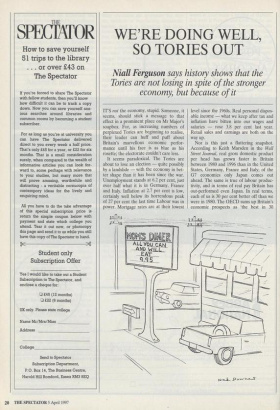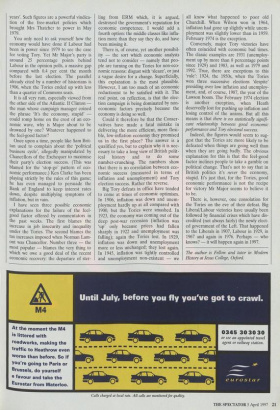WE'RE DOING WELL, SO TORIES OUT
Niall Ferguson says history shows that the Tories are not losing in spite of the stronger economy, but because of it
IT'S not the economy, stupid. Someone, it seems, should stick a message to that effect in a prominent place on Mr Major's soapbox. For, as increasing numbers of perplexed Tories are beginning to realise, their leader can huff and puff about Britain's marvellous economic perfor- mance until his face is as blue as his rosette; the electorate couldn't care less.
It seems paradoxical. The Tories are about to lose an election — quite possibly by a landslide — with the economy in bet- ter shape than it has been since the war. Unemployment stands at 6.2 per cent, just over half what it is in Germany, France and Italy. Inflation at 2.7 per cent is low, certainly well below its horrendous peak of 27 per cent the last time Labour was in power. Mortgage rates are at their lowest level since the 1960s. Real personal dispos- able income — what we keep after tax and inflation have bitten into our wages and salaries — rose 3.8 per cent last year. Retail sales and earnings are both on the way up.
Nor is this just a flattering snapshot. According to Keith Marsden in the Wall Street Journal, real gross domestic product per head has grown faster in Britain between 1980 and 1996 than in the United States, Germany, France and Italy; of the G7 economies only Japan comes out ahead. The same is true of labour produc- tivity, and in terms of real pay Britain has out-performed even Japan. In real terms, each of us is 30 per cent better off than we were in 1980. The OECD sums up Britain's economic prospects as 'the best in 30 years'. Such figures are a powerful vindica- tion of the free-market policies which brought Mrs Thatcher to power in May 1979.
You only need to ask yourself how the economy would have done if Labour had been in power since 1979 to see the case for voting Tory. Yet Mr Major's, party is around 25 percentage points behind Labour in the opinion polls, a massive gap compared with 0.4 per cent the month before the last election. The parallel already cited by a number of historians is 1906, when the Tories ended up with less than a quarter of Commons seats.
It is all very rum, especially viewed from the other side of the Atlantic. If Clinton the man whose campaign manager coined the phrase 'It's the economy, stupid' could romp home on the crest of an eco- nomic wave, why is Major about to be drowned by one? Whatever happened to the feel-good factor?
Once upon a time, people like Sam Brit- tan used to complain about the 'political business cycle', allegedly manipulated by Chancellors of the Exchequer to maximise their party's election success. (This was blamed for the `stop-go' pattern of eco- nomic performance.) Ken Clarke has been playing strictly by the rules of this game; he has even managed to persuade the Bank of England to keep interest rates down, despite multiplying symptoms of inflation, but in vain.
I have seen three possible economic explanations for the failure of the feel- good factor offered by commentators in the past weeks. The first blames the increase in job insecurity and inequality under the Tories. The second blames the tax increases imposed when Norman Lam- ont was Chancellor. Number three — the most popular — blames the very thing to which we owe a good deal of the recent economic recovery: the departure of ster- ling from ERM which, it is argued, destroyed the government's reputation for economic competence. I would add a fourth option: the middle classes like infla- tion more than they say they do, and have been missing it.
There is, of course, yet another possibil- ity — the sort which economic analysts tend not to consider — namely that peo- ple are turning on the Tories for non-eco- nomic reasons: disgust with 'sleaze', or just a vague desire for a change. Superficially, this explanation is the most plausible. However, I am too much of an economic reductionist to be satisfied with it. The real point, on reflection, is that the elec- tion campaign is being dominated by non- economic factors precisely because the economy is doing so well.
Could it therefore be that the Conser- vatives have made a fatal mistake in delivering the more efficient, more flexi- ble, low-inflation economy they promised us in the first place? The answer is a qualified yes, but to explain why it is nec- essary to take a long view of British polit- ical history and to do some number-crunching. The numbers show that there is no correlation between eco- nomic success (measured in terms of inflation and unemployment) and Tory election success. Rather the reverse.
Big Tory defeats in office have tended to come at times of economic optimism. In 1906, inflation was down and unem- ployment hardly up at all compared with 1900, but the Tories were smashed. In 1923, the economy was coming out of the deep post-war recession (inflation was `up' only because prices had fallen sharply in 1922 and unemployment was falling); again the Tories lost. In 1929, inflation was down and unemployment more or less unchanged; they lost again. In 1945, inflation was tightly controlled and unemployment non-existent — we all know what happened to poor old Churchill. When Wilson won in 1964, inflation had gone up slightly while unem- ployment was slightly lower than in 1959. February 1974 is the exception.
Conversely, major Tory victories have often coincided with economic bad times. The classic examples are 1931 (unemploy- ment up by more than 8 percentage points since 1929) and 1983, as well as 1979 and 1992. True, there are exceptions to this `rule': 1924, the 1950s, when the Tories won three successive elections 'despite' presiding over low inflation and unemploy- ment, and, of course, 1987, the year of the Lawson boom. The February 1974 election is another exception, when Heath deservedly lost for pushing up inflation and losing control of the unions. But all this means is that there is no statistically signifi- cant relationship between good economic performance and Tory electoral success.
Indeed, the figures would seem to sug- gest that the Tories are more likely to be defeated when things are going well than when they are going badly. The obvious explanation for this is that the feel-good factor inclines people to take a gamble on political change. That's not to say that in British politics it's never the economy, stupid. It's just that, for the Tories, good economic performance is not the recipe for victory Mr Major seems to believe it to be.
There is, however, one consolation for the Tories on the eve of their defeat. Big Liberal/Labour victories have usually been followed by financial crises which have dis- credited (not always fairly) the newly elect- ed government of the Left. That happened to the Liberals in 1907, Labour in 1929, in 1967 and again in 1976. Perhaps — who knows? — it will happen again in 1997.
The author is Fellow and tutor in Modem History at Jesus College, Oxford.



























































 Previous page
Previous page